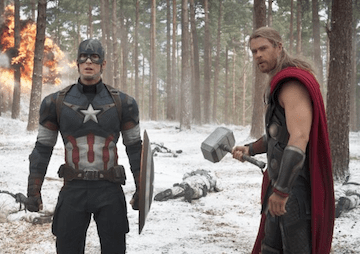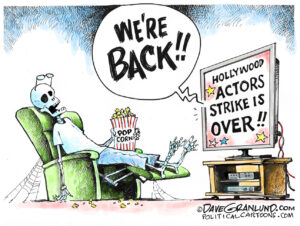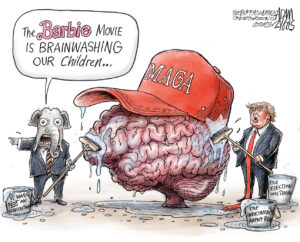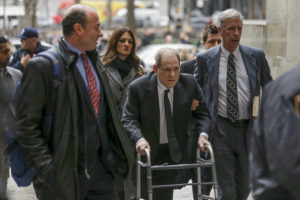Hollywood Has Lost the Plot
In a rush for profits, the movie industry has succumbed to a formula of “ridiculously over-complicated plotting” and the domination of a handful of increasingly artless franchises. Captain America (Chris Evans) and Thor (Chris Hemsworth) in "Avengers: Age of Ultron." (Walt Marvel Studios)
Captain America (Chris Evans) and Thor (Chris Hemsworth) in "Avengers: Age of Ultron." (Walt Marvel Studios)
In a rush for profits, Hollywood has succumbed to a formula of “ridiculously over-complicated plotting” and the domination of a handful of increasingly artless franchises.
What has happened to the industry over the past two decades between the handful of suspenseful, major sequences in “Jurassic Park” and the wall-to-wall action in “Jurassic World”? Guardian contributor Phil Hoad answers:
In the rush to give restless, spoilt-for-choice modern viewers value for money, the studios are making their blockbusters in an ever more feverish climate. The past decade has seen, in the struggle for prime spots on the movie-going calendar, the rise of release dates locked in years in advance. In order to hit those targets, production schedules have little room for deviation; finished scripts often lag behind the key special-effects sequences, which are devised early so mockups around which actors can be directed are ready when shooting starts. Screenwriters, says Pearce, are often left to link the showpieces as best as they can. …
“People are so in the white-hot crucible of terror of making the movie,” he continues, “It’s very difficult for them to take a step back and look at the story at a macro level.” This often results in a storyline that’s hectoring but lacking in any emotional through-line; the kind of rickety plot-slalom that in the case of the interminable Transformers films, batters the viewer into a state of “weird, robot-based PTSD”. …
Another major culprit in contorting and convoluting blockbuster plots is the need to service the overarching franchises that now rule the business. Not only is squeezing the likes of the voluminous Marvel and DC mythology into two-hour chunks a serious logistical challenge, but the reverence for branded IP (intellectual property) over original pitches has shifted the balance of power in the scripting process further from those most equipped to lead it. …
… Hollywood’s most insidious recent innovation: the alternate timeline. The rebooted Star Trek franchise – which takes place in an alternative reality to the original Shatner iteration, triggered by a Romulan vessel travelling back in time and killing Captain Kirk’s father – has handled the idea relatively gracefully. But, in the wrong hands, as in Terminator Genisys, it becomes a carte blanche for Hollywood to over-embroider stories already told succinctly, or erase them at will, usually when there’s a commercial incentive. The more it happens, the more Hollywood saps its own sense of dramatic finality. One trend Beacham has noticed is that it is rare for any character to die, just in case they are needed in future; Gemma Arterton’s character, Io, was destined for the chop in the first-pass draft he did of Clash of the Titans, but in the final version Zeus handily resurrects her. And even if they do irreversibly shuffle off, like Darth Vader, there’s always the prequel.
Read more here.
— Posted by Alexander Reed Kelly.
Your support matters…Independent journalism is under threat and overshadowed by heavily funded mainstream media.
You can help level the playing field. Become a member.
Your tax-deductible contribution keeps us digging beneath the headlines to give you thought-provoking, investigative reporting and analysis that unearths what's really happening- without compromise.
Give today to support our courageous, independent journalists.






You need to be a supporter to comment.
There are currently no responses to this article.
Be the first to respond.